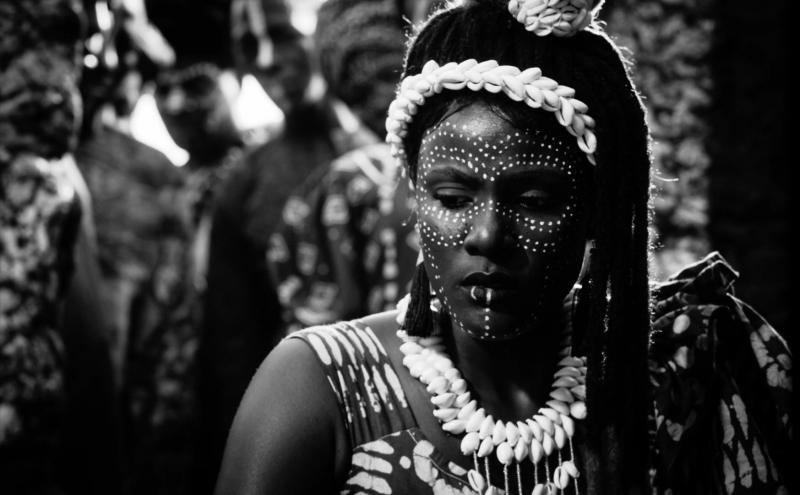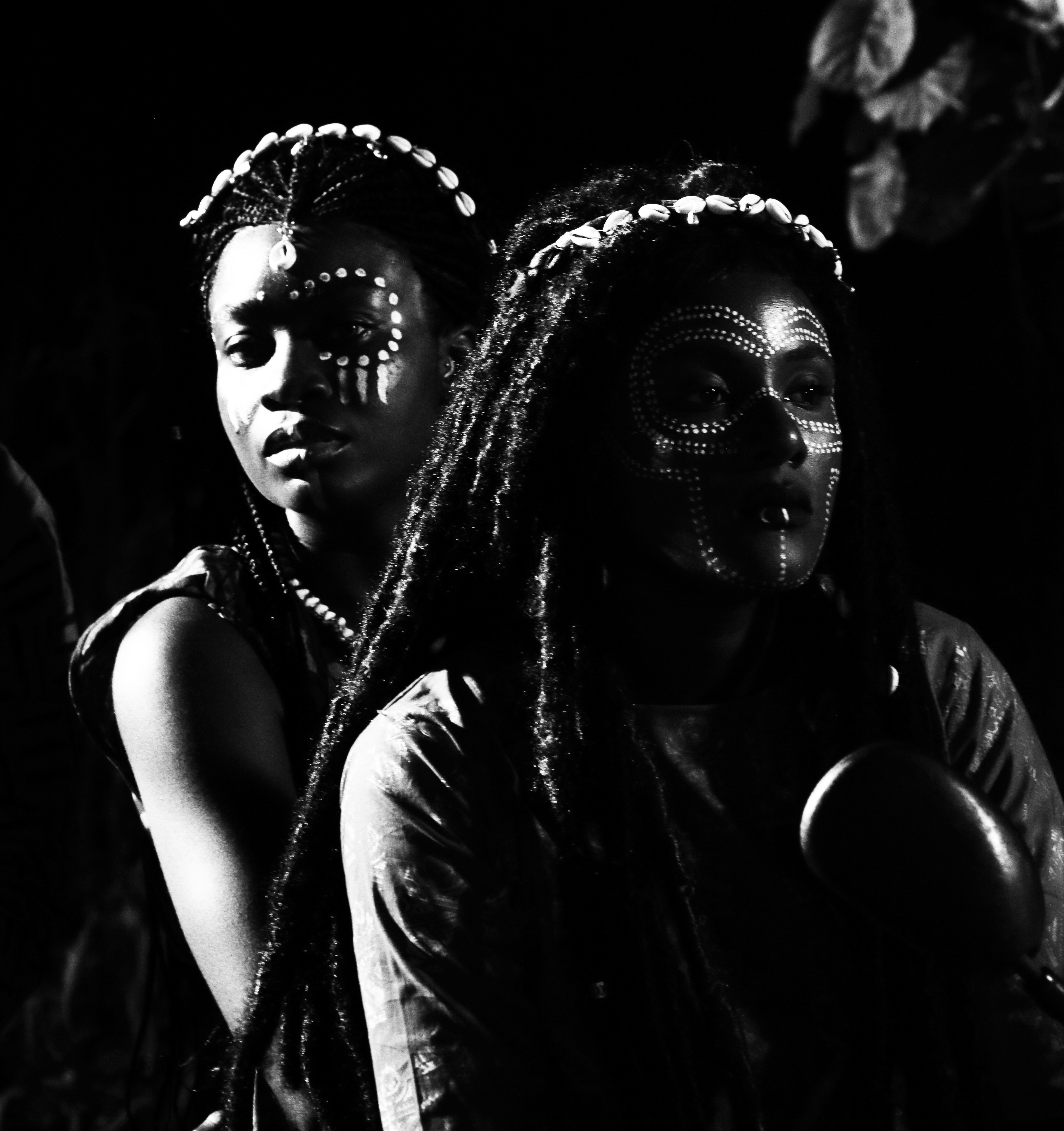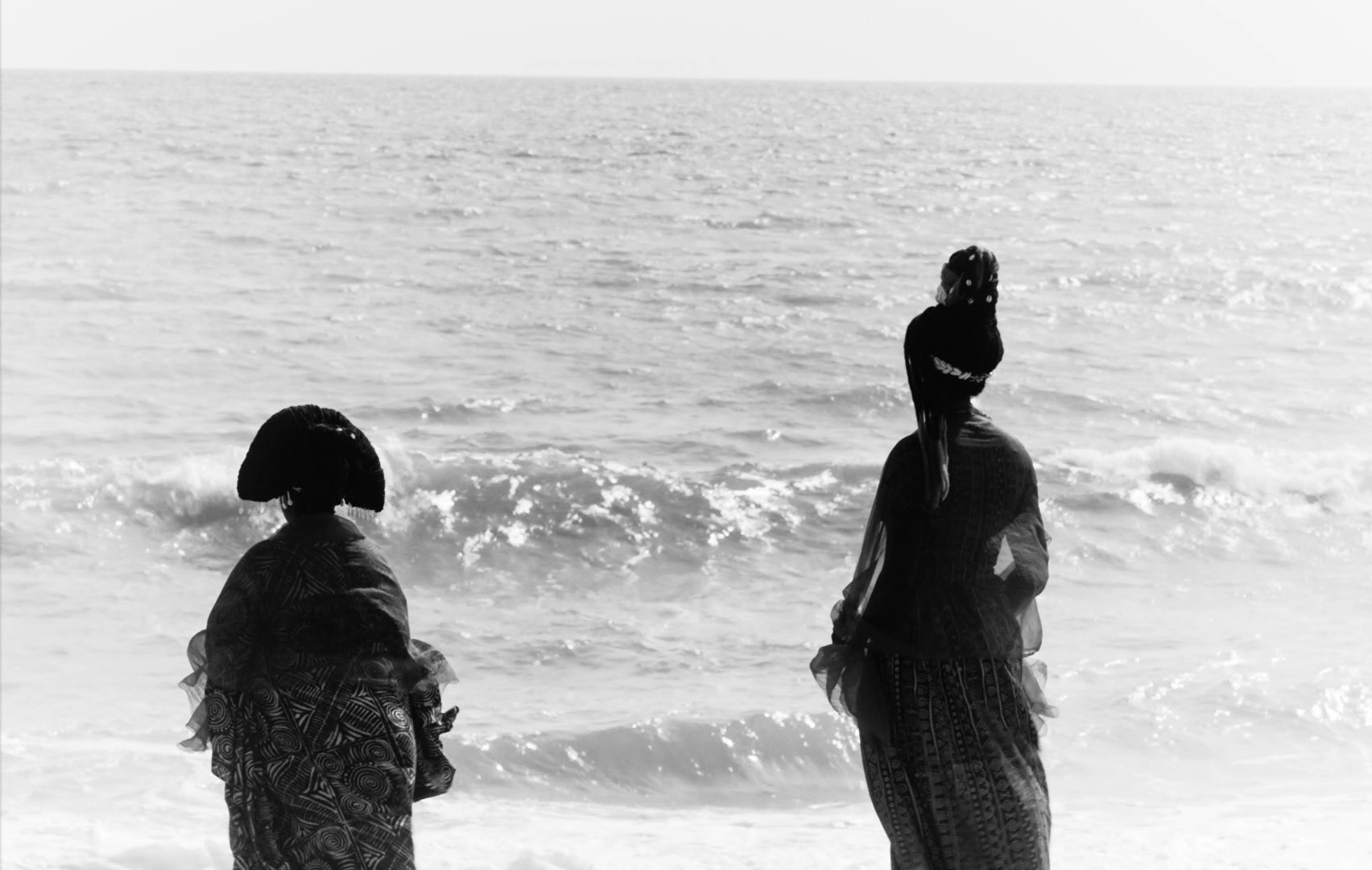Mami Wata review – a gorgeous, strange African fable | reviews, news & interviews
Mami Wata review – a gorgeous, strange African fable
Mami Wata review – a gorgeous, strange African fable
Monochrome imagery illuminates a mythic war for a village's soul

Mami Wata is the female West African water god still worshipped in Iyi, a fragile, matriarchal village redoubt against modernity. Writer-director C.J. “Fiery” Obasi’s third film makes Iyi a battleground for African identity, in a glistening black-and-white fable played out to the sea’s constant, low crash and wash.
Mama Efe (Rita Edochie) is Mami Wata’s Intermediary, receiving the villagers’ tithe in return for divine protection. But when she can’t revive the drowned friend of her headstrong daughter Zinwe (Uzoamaka Aniunoh), the latter bitterly runs off with a vital totem, leaving her wiser sister Prisca (Evelyne Ily, pictured below right with Aniunoh) with the waning matriarch, already subject to insolent sneers from neighbouring men. When dreadlocked castaway Jasper (Emeka Amakeze) washes ashore half-dead, Mama and Prisca nurse him back to health, Prisca then making ecstatic, relieved love with him.

Obasi’s debut, Ojuju (2014), was a zero-budget zombie film, and his second, O-Town (2015), a crime thriller, and he grew up steeped in Stephen King. This latest low-budget genre film, co-financed in his native Nigeria and shot in Benin, comfortably combines magical realism, rural horror and West African folklore. There are parallels to Mark Jenkin’s micro-budget Cornish horror films in Obasi’s jerky jump-cut apparitions and sparse, enigmatic milieu. Soares’ monochrome cinematography helps take Mami Wata out of time. Samy Bardet’s oceanic sound design and Tunde Jegede’s score – brooding then lilting, leaning on traditional kora and Ngoni instruments and songs by Amadou and Mariam – add to the near-psychedelic, hauntingly strange visions in this place of water and forest at the luminous, liminal edge of its world, where either all things are still possible, or magically suspended tradition will crumble.
 Prisca’s white-beaded makeup (by Campbell Precious Arebamen) is the sort of venerable look often blended into the Afrofuturism which Black Panther made a global cutting-edge. Against this, Obasi sets quiet, naturalistic scenes, like Prisca’s quiet night-time conversation with a male admirer in a bar, swigging bottles then dancing by beachside flames.
Prisca’s white-beaded makeup (by Campbell Precious Arebamen) is the sort of venerable look often blended into the Afrofuturism which Black Panther made a global cutting-edge. Against this, Obasi sets quiet, naturalistic scenes, like Prisca’s quiet night-time conversation with a male admirer in a bar, swigging bottles then dancing by beachside flames.
There are real arguments against Iyi’s stubborn holdout - as unlikely yet somehow impervious as Asterix’s Gauls. Obasi himself plays an English-speaking doctor arriving to offer the same medicine, hospitals and schools Jasper fraudulently dangles, only for Mama Efe to trust in Mami Wata’s beneficence. Obasi takes the side of myth and magic, of ancient verities against the corrupting outside. He also delivers a gripping, gorgeously shot yarn, pushing beyond Nollywood.
The future of Arts Journalism
You can stop theartsdesk.com closing!
We urgently need financing to survive. Our fundraising drive has thus far raised £49,000 but we need to reach £100,000 or we will be forced to close. Please contribute here: https://gofund.me/c3f6033d
And if you can forward this information to anyone who might assist, we’d be grateful.

Subscribe to theartsdesk.com
Thank you for continuing to read our work on theartsdesk.com. For unlimited access to every article in its entirety, including our archive of more than 15,000 pieces, we're asking for £5 per month or £40 per year. We feel it's a very good deal, and hope you do too.
To take a subscription now simply click here.
And if you're looking for that extra gift for a friend or family member, why not treat them to a theartsdesk.com gift subscription?
more Film
 A House of Dynamite review - the final countdown
Kathryn Bigelow's cautionary tale sets the nuclear clock ticking again
A House of Dynamite review - the final countdown
Kathryn Bigelow's cautionary tale sets the nuclear clock ticking again
 theartsdesk Q&A: Idris Elba on playing a US President faced with a missile crisis in 'A House of Dynamite'
The star talks about Presidential decision-making when millions of lives are imperilled
theartsdesk Q&A: Idris Elba on playing a US President faced with a missile crisis in 'A House of Dynamite'
The star talks about Presidential decision-making when millions of lives are imperilled
 Urchin review - superb homeless drama
Frank Dillane gives a star-making turn in Harris Dickinson’s impressive directorial debut
Urchin review - superb homeless drama
Frank Dillane gives a star-making turn in Harris Dickinson’s impressive directorial debut
 Mr Blake at Your Service review - John Malkovich in unlikely role as an English butler
Weird comedy directed by novelist Gilles Legardinier
Mr Blake at Your Service review - John Malkovich in unlikely role as an English butler
Weird comedy directed by novelist Gilles Legardinier
 Don't Let's Go to the Dogs Tonight review - vivid adaptation of a memoir about a Rhodesian childhood
Embeth Davidtz delivers an impressive directing debut and an exceptional child star
Don't Let's Go to the Dogs Tonight review - vivid adaptation of a memoir about a Rhodesian childhood
Embeth Davidtz delivers an impressive directing debut and an exceptional child star
 One Battle After Another review - Paul Thomas Anderson satirises America's culture wars
Leonardo DiCaprio, Teyana Taylor, and Sean Penn star in a rollercoasting political thriller
One Battle After Another review - Paul Thomas Anderson satirises America's culture wars
Leonardo DiCaprio, Teyana Taylor, and Sean Penn star in a rollercoasting political thriller
 Steve review - educator in crisis
Cillian Murphy excels as a troubled headmaster working with delinquent boys
Steve review - educator in crisis
Cillian Murphy excels as a troubled headmaster working with delinquent boys
 Can I get a Witness? review - time to die before you get old
Ann Marie Fleming directs Sandra Oh in dystopian fantasy that fails to ignite
Can I get a Witness? review - time to die before you get old
Ann Marie Fleming directs Sandra Oh in dystopian fantasy that fails to ignite
 Happyend review - the kids are never alright
In this futuristic blackboard jungle everything is a bit too manicured
Happyend review - the kids are never alright
In this futuristic blackboard jungle everything is a bit too manicured
 Robert Redford (1936-2025)
The star was more admired within the screen trade than by the critics
Robert Redford (1936-2025)
The star was more admired within the screen trade than by the critics

Add comment